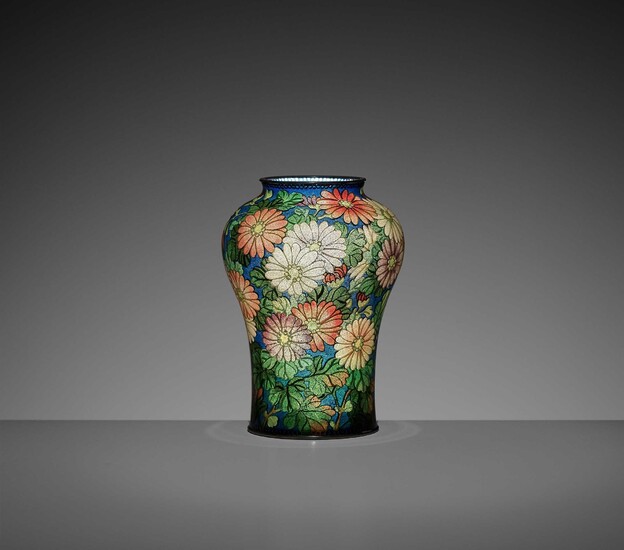A SUPERB PLIQUE-À-JOUR VASE WITH CHRYSANTHEMUMS, ATTRIBUTED TO HATTORI TADASABURO
Attributed to Hattori Tadasaburo (d. 1939), unsigned
Japan, c. 1905, Meiji period (1868-1912)
The baluster sides rising to a short waisted neck, applied with silver rims, delicately worked in silver wire and bright enamels in shades of red, violet, yellow, green, and white against a dark-blue ground with numerous overlapping chrysanthemums borne on leafy vines.
HEIGHT 9 cm
Condition: Excellent condition with minor wear.
Provenance: Private collection, purchased from Malcolm Fairley Ltd.
With a padded silk box and cover.
Although the inveterate innovator Namikawa Sosuke (1847-1910) is thought to have developed plique-à-jour in the early 1890s, it was probably not until after 1900 that it became possible to produce pieces on this scale, since it is almost impossible to avoid some small cracks during the cooling process.
Auction comparison:
Compare a related but considerably larger and later plique-à-jour vase, also densely decorated with colorful flowers, dated to the Showa period, at Christie’s, The Avo Krikorian Collection: Innovation and Inspiration of Meiji Period Design 19 February 2007, Geneva, lot 115 (sold for 14,400 CHF).
Lot details
Attributed to Hattori Tadasaburo (d. 1939), unsigned
Japan, c. 1905, Meiji period (1868-1912)
The baluster sides rising to a short waisted neck, applied with silver rims, delicately worked in silver wire and bright enamels in shades of red, violet, yellow, green, and white against a dark-blue ground with numerous overlapping chrysanthemums borne on leafy vines.
HEIGHT 9 cm
Condition: Excellent condition with minor wear.
Provenance: Private collection, purchased from Malcolm Fairley Ltd.
With a padded silk box and cover.
Although the inveterate innovator Namikawa Sosuke (1847-1910) is thought to have developed plique-à-jour in the early 1890s, it was probably not until after 1900 that it became possible to produce pieces on this scale, since it is almost impossible to avoid some small cracks during the cooling process.
Auction comparison:
Compare a related but considerably larger and later plique-à-jour vase, also densely decorated with colorful flowers, dated to the Showa period, at Christie’s, The Avo Krikorian Collection: Innovation and Inspiration of Meiji Period Design 19 February 2007, Geneva, lot 115 (sold for 14,400 CHF).
Sale price
Time, Location
Auction House
Attributed to Hattori Tadasaburo (d. 1939), unsigned
Japan, c. 1905, Meiji period (1868-1912)
The baluster sides rising to a short waisted neck, applied with silver rims, delicately worked in silver wire and bright enamels in shades of red, violet, yellow, green, and white against a dark-blue ground with numerous overlapping chrysanthemums borne on leafy vines.
HEIGHT 9 cm
Condition: Excellent condition with minor wear.
Provenance: Private collection, purchased from Malcolm Fairley Ltd.
With a padded silk box and cover.
Although the inveterate innovator Namikawa Sosuke (1847-1910) is thought to have developed plique-à-jour in the early 1890s, it was probably not until after 1900 that it became possible to produce pieces on this scale, since it is almost impossible to avoid some small cracks during the cooling process.
Auction comparison:
Compare a related but considerably larger and later plique-à-jour vase, also densely decorated with colorful flowers, dated to the Showa period, at Christie’s, The Avo Krikorian Collection: Innovation and Inspiration of Meiji Period Design 19 February 2007, Geneva, lot 115 (sold for 14,400 CHF).
Lot details
Attributed to Hattori Tadasaburo (d. 1939), unsigned
Japan, c. 1905, Meiji period (1868-1912)
The baluster sides rising to a short waisted neck, applied with silver rims, delicately worked in silver wire and bright enamels in shades of red, violet, yellow, green, and white against a dark-blue ground with numerous overlapping chrysanthemums borne on leafy vines.
HEIGHT 9 cm
Condition: Excellent condition with minor wear.
Provenance: Private collection, purchased from Malcolm Fairley Ltd.
With a padded silk box and cover.
Although the inveterate innovator Namikawa Sosuke (1847-1910) is thought to have developed plique-à-jour in the early 1890s, it was probably not until after 1900 that it became possible to produce pieces on this scale, since it is almost impossible to avoid some small cracks during the cooling process.
Auction comparison:
Compare a related but considerably larger and later plique-à-jour vase, also densely decorated with colorful flowers, dated to the Showa period, at Christie’s, The Avo Krikorian Collection: Innovation and Inspiration of Meiji Period Design 19 February 2007, Geneva, lot 115 (sold for 14,400 CHF).



